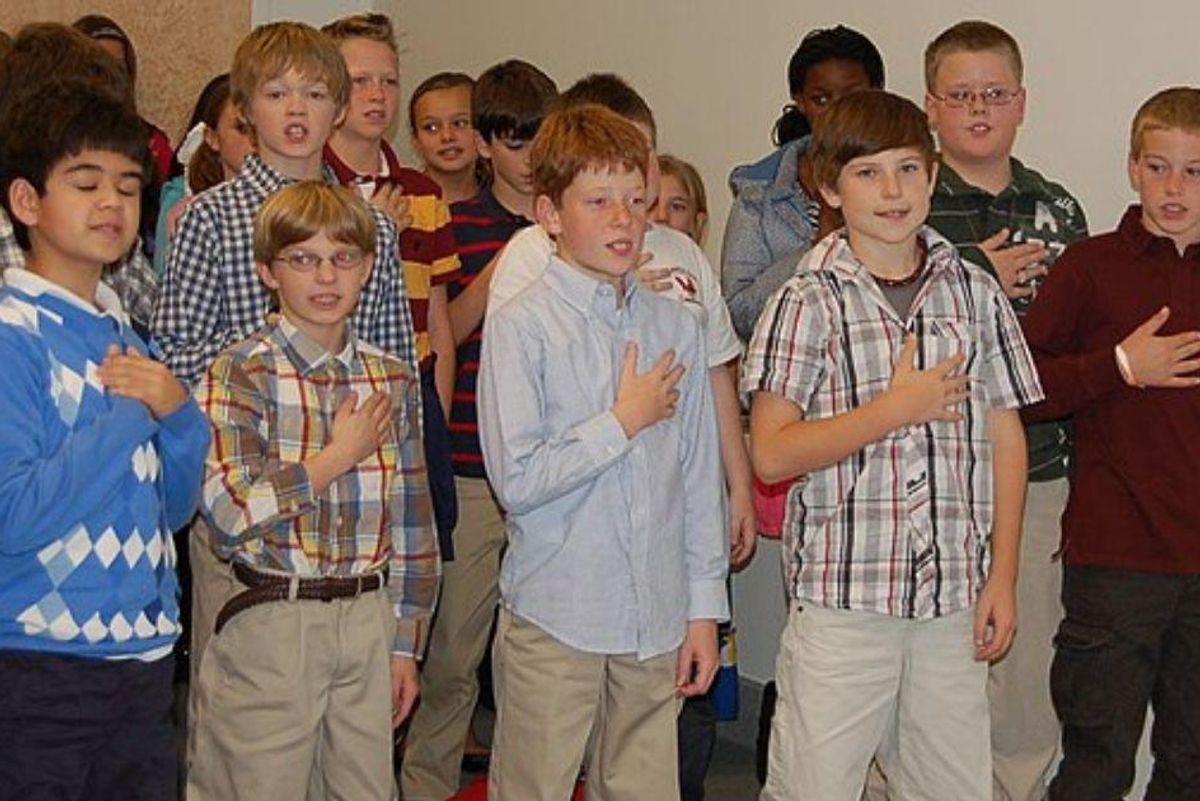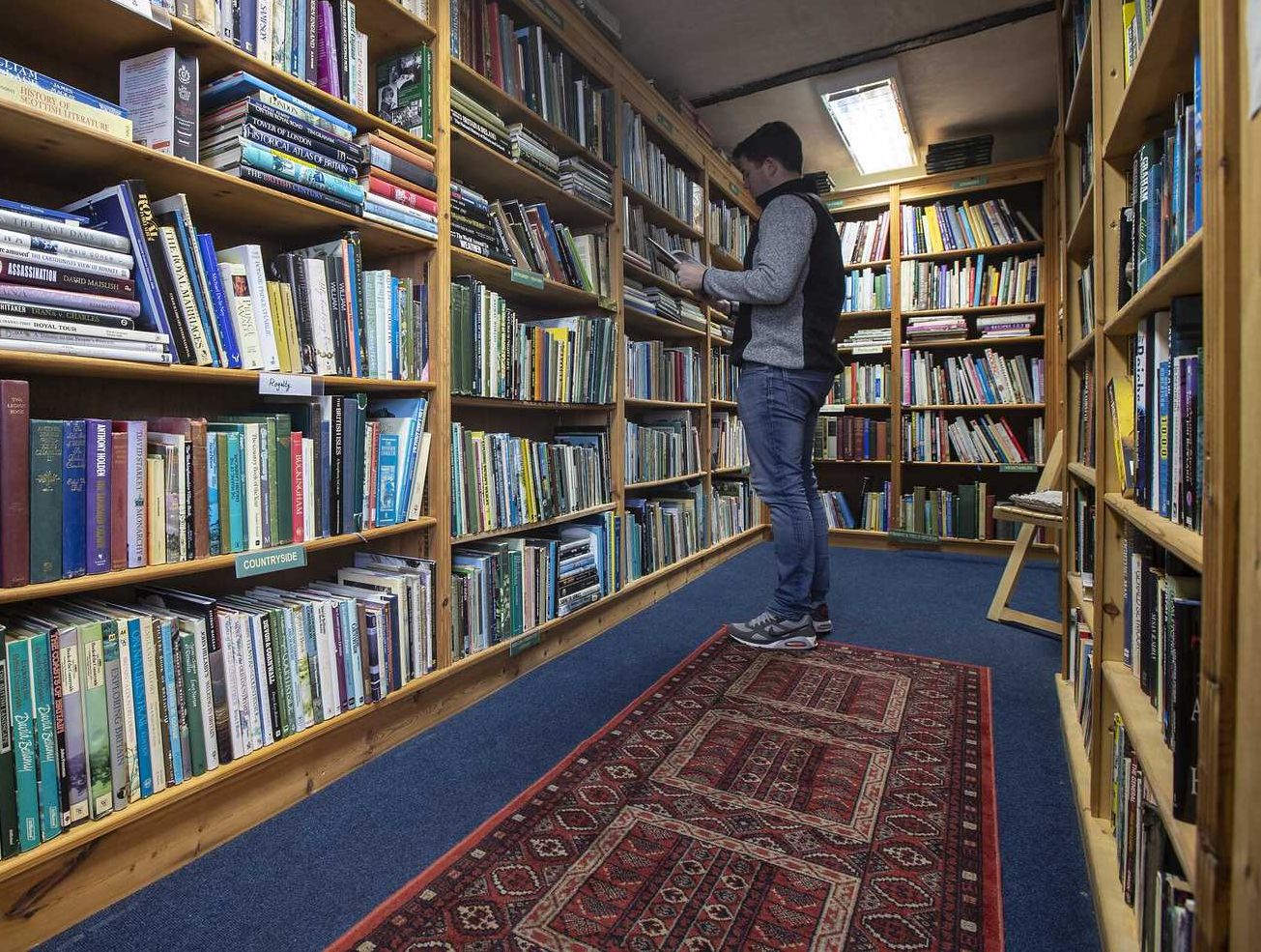Brits share the most 'bizarre' things Americans do that seem unbelievable across the pond
Our friends across the pond offer some outside perspective on our habits, from the pledge of allegiance to spray cheese.

From an outside perspective, the pledge of allegiance seems "culty."
You know how you were raised in a household where things were done a certain way, and then at some point, you went to other people's houses and saw that other people's families lived completely differently and it sort of blew your mind? Different rules, different standards, different consequences, different habits—all of which were considered normal to them? Some of those differences may have made you thank the heavens for your parents, or they may have made you realize your own family had some issues you didn't recognize.
The same thing happens when you are born and raised in a specific culture. Your sense of what's normal is molded by it—so much so that you may never even think to question whether certain things are actually rather bizarre.
That's why it's nice to have some outside perspective sometimes.
A Reddit user asked "What is the most bizarre thing Americans do that feels unbelievable by British standards?" and the answers are eye-opening.
Pledging allegiance to the flag
The first response was "Having kids pledge allegiance to the flag in school. Seems culty."
Most adult Americans were trained as young children to place our hands over our hearts, face the flag and recite the pledge every morning at school. Every single morning. Swearing our allegiance to our country and its flag, out loud, in unison.
"I went to an American school while I lived in Italy; I was one of the only English kids there. The pledge of allegiance was indeed every morning, and it felt as culty as you think. They called my parents when I wasn't joining in ffs," wrote one commenter.
"Never mind seeming culty, it just flat out is," wrote another.
And another: "As an expat, I can confirm that having to pledge allegiance to the American flag was definitely one of the weirdest things that contributed to the culture shock."
Let's be real. If we saw children from any country deemed unsavory to American sensibilities (let's say Russia, China, North Korea, for example) being required to stand in unison and recite a pledge of allegiance to their country's flag every single morning, we'd consider it brainwashing.
There's a reason that first comment got more than 5,500 upvotes.
The way we do healthcare
The comment "Going bankrupt because you needed your broken leg realigned. Being homeless as a result of needing to pay for cancer treatment" garnered 2,000 likes because the U.S. approach to healthcare is genuinely bizarre.
Everything Americans accept about healthcare is asinine: the for-profit health insurance industry, the fact that health insurance is tied to employment (but not all employment, because that would make too much sense, apparently), the fact that we pay way more for healthcare than other wealthy nations and yet have worse health outcomes, the fact that virtually no one understands how their health insurance works because it's so complicated, the fact that medical bankruptcy is a thing, etc.
And on top of that, the fact that there is a baffling number of Americans who actually defend this system when all evidence points to the superiority of universal healthcare is absolutely mind-blowing.
How we don't do guaranteed paid parental leave
"No paid maternity/paternity leave and new mothers having to go back to work within two weeks of giving birth. Insane," wrote one commenter.
After Americans tried to say this wasn't true because their company offers paid leave, the commenter clarified that the U.S. doesn't require paid leave. It's up to the discretion of companies, which is, indeed, insane.
"I've always thought this was barbaric but since having my baby it horrifies me even more," someone wrote in response. "My baby is 12 months old next weekend and I'm still on leave. My mat leave is just finishing and I'm about to start annual leave which will see me through until January. I've been on around half pay for the year which has been tough financially but I wouldn't give up this time for anything.
"At 2 weeks I could still hardly sit (episiotomy), my boobs were painfully full and leaking all the time, I was barely managing to get dressed, my baby was wanting to be held at all times day and night... I was hardly functioning.
"We don't separate kittens and puppies from their mothers that early, how can it possibly be okay to separate babies from their mothers."
School shootings and the active shooter drills that go along with them
Well, yeah. Not exactly a point of pride.
It's not that other countries never ever have school shootings, but the U.S. is in a league of our own here.
"My cousins in America do school shooting practises every term," wrote one commenter. "It's awful that that's a thing they need. Scary."
"You can buy bulletproof school bags," wrote another. "It's nuts."
To be fair, most Americans would agree that school shootings and active shooter drills are bizarre. We just can't agree on what to do about it.
Our lack of electric kettles, apparently
One commenter wrote:
"On a less serious note, boiling water in a pan (or microwaving it!) for a cup of tea or coffee. I've seen it when watching regular people do videos, not just on tv or whatever. Where are all the kettles??(There are a lot about guns and stuff, so I thought I'd do one that's less sad.)"
Others chimed in:
"I'm a Brit living in the US and my electric kettle is viewed by some of my American friends as a revelation. I buy them as gifts."
"Both times I've been to America, I would go down to reception at the hotel and ask for a kettle. The receptionist would look at me dumbly and ask what a kettle was. And this wasn't once or twice. This was multiple times."
Some people explained some reasons for kettles being rare-but-not-unheard-of, ranging from the voltage being different in the U.S. to the fact that microwaving water is quick and easy. But there's also this:
"British/American living in the US... No one I know really drinks tea with enough regularity to warrant a kettle, specially living in tiny apartments with limited kitchen space. Coffee makers are a lot more common because coffee is more popular than tea that I've seen."
This is the truth. (And I do know a lot of people with electric kettles, but it apparently varies from region to region.)
We don't walk when we can drive
Several commenters pointed to Americans' resistance to walking anywhere that's farther than a block or two, as well as our lack of sidewalks and walkways to even make it possible:
"No pavements/sidewalks in some places. I went to Dallas for work some years ago, and was dismayed to find that I couldn't just 'go for a walk' from the hotel."
"Yes! Nobody there walks ANYWHERE. I have a friend who is from Iowa but lived in London for a few years. When she went back she said she really misses walking. I asked what she meant, she said if she just went on a random walk she'd definitely get people stopping for her thinking she's not okay, not okay in the head or just homeless."
"I was reading a book the other day that described a woman walking two miles to then get a bus home as a 'hike'. I mean, that's just walking? Sure it was alongside a road not on a pavement but it's still just walking!"
"Yep, that's really weird. I went to an IT conference in Orlando back in the late 1990's. The hotel was only about a kilometre from the conference centre, so obvs we walked as the weather was nice. Not only was it tricky due to the lack of any footpath, people thought we were mad. Also you can't just cross the road where you want to."
Sorry, Brits. Our land is big and our gas is cheap compared to yours. And also, you know we're notorious for our unhealthy habits.
Sales tax tacked on at the end of a purchase
"Taxes put on at check out," wrote one commenter.
Wait, what? This isn't normal?
Apparently not.
"The taxes infuriate me," wrote one commenter. "I was in Canada last week and they do the same thing. I kept thinking I was being overcharged until I remembered that advertised prices don't include taxes, and that you're expected to tip for pretty much everything."
"I only found out about the tax thing recently and it f*cking blew my mind," wrote another. "How tf do you know how much cash you'll need? Americans must be really good at mental arithmetic if they have to add tax every time they add something to their basket."
Spoiler: We're not all that good at mental arithmetic. We just know we need about 10% more money than what a thing actually costs.
Agreed, though. It's weird and annoying.
This isn't an exhaustive list, by any means. Other "bizarre" American habits include circumcision (just the messenger—please don't send me hate mail), televangelism, prescription drug commercials and spray cheese.
Definitely some food for thought as we consider what's "normal" and what's not. Different or even "bizarre" isn't necessarily bad, but we could certainly do some national soul-searching with some of the things on this list.
(And hey, British friends—the way you say "aluminum" is weird. So there.)
This article originally appeared on 11.18.21
- A guy describes the difference between British and American ... ›
- British TikTokker responds to Americans who think UK people can't ... ›
- A British man hilariously guessed what all 50 U.S. states are famous ... ›
- American mom living in Germany dispels myths about living overseas - Upworthy ›
- Things happen in other countries that would terrify Americans - Upworthy ›
- Things happen in other countries that would terrify Americans - Upworthy ›
- Americans shocked some British people don't rinse soap off dishes - Upworthy ›
- Brits measure distance in miles. Americans measure it in time. - Upworthy ›
- 29-year-old moves to UK and is baffled when her boyfriend hides his pajamas under a pillow - Upworthy ›
- American woman doesn't want to freak out an Englishman so she turns to the internet for advice - Upworthy ›
- 15 cool things people have in other countries that Americans want - Upworthy ›
- People from other countries share 14 things that instantly tell them someone's American - Upworthy ›
- Scottish woman baffled at what Americans who rented her apartment left behind - Upworthy ›
- Japanese-Brit shares 10 things she loves about the U.S. - Upworthy ›
- Americans share 15 of the coolest things they've seen overseas that they want here. Like, now. - Upworthy ›
- Americans share 15 of the coolest things they've seen overseas that they want here. Like, now. - Upworthy ›
- Americans share the 15 funniest things they've heard non-Americans say about what the U.S. is like - Upworthy ›
- Europeans are admitting these 16 everyday American conveniences would be "luxuries" back home - Upworthy ›









 A woman reading a book.via
A woman reading a book.via A woman tending to her garden.via
A woman tending to her garden.via

 Cats can be finicky about how they're held.
Cats can be finicky about how they're held.  Squish that cat.
Squish that cat. 

 A person browses at The Open Book in Scotland.Photo Credit: Colin Tennant, Flickr
A person browses at The Open Book in Scotland.Photo Credit: Colin Tennant, Flickr The bedroom for rent above The Open Book in Scotland.Photo Credit: Colin Tennant, Flickr
The bedroom for rent above The Open Book in Scotland.Photo Credit: Colin Tennant, Flickr